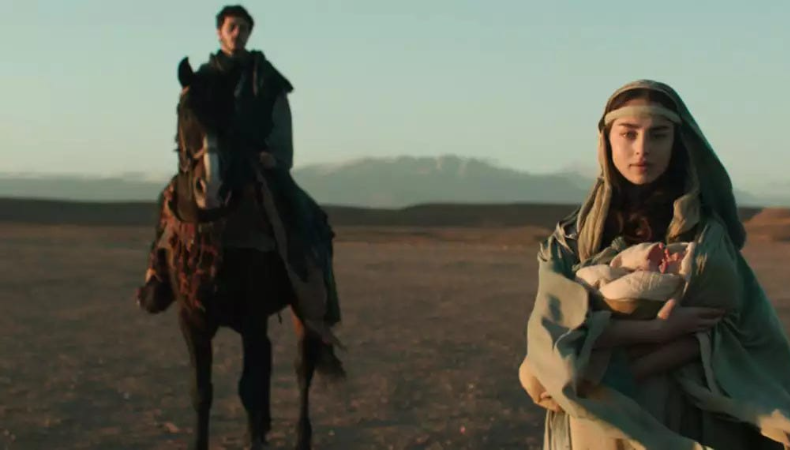Netflix’s ‘Mary’ Faces Backlash Over Casting Amid Calls for Palestinian Representation

Recently, Netflix released the teaser for their forthcoming faith-based drama Mary, which centers on the story of Jesus’ mother. Although the movie aims to present a novel viewpoint on one of the most venerated leaders in Christianity, an explosion of criticism has eclipsed the news. Critics and supporters of representation have denounced the movie for ignoring Palestinian perspectives and selecting mostly white European and Israeli actors in pivotal parts, sparking fierce arguments on social media and beyond.
The issue revolves mostly around the casting of Israeli actress Noa Cohen as Mary alongside fellow Israeli actors Ori Pfeffer and Ido Tako. Critics contend that these decisions not only ignore the Palestinian identity strongly connected to Mary’s tale but also support cultural erasure in a Middle East-based drama.
Users of social media soon noted how homogeneous the cast was. “The whole main cast is white Europeans except for one biracial guy,” one user pointed out, stressing the disparity. This attitude captures a rising annoyance with Hollywood’s continuous inclination to give Westernized portrayals of historically non-Western personalities first priority.
Fueling the flames, Cohen’s participation in the Israeli-Azerbaijani film Silent Game has come under scrutiny once more. Critics have charged her of working on a project purportedly “whitewashed Azerbaijan’s ethnic cleansing of 120,000 Christians in Artsakh.” Many people have questioned Netflix’s choice to cast Cohen in such a historically and culturally important position because of this link.
A Broad Political Context
The criticism directed against Mary is not occurring in a vacuum. The debate arises during a period of increased strife in the Israeli-Palestinian conflict, with continuous violence in Gaza and attacks on Palestinian Christians attracting worldwide censure. Many find especially disrespectful the casting of Israeli actors in a movie about Mary, a person anchored in Palestinian background.
One much shared post said, “There is something profoundly offensive about having an Israeli actor play Mary, the mother of Jesus, while Israel is committing genocide against Palestinians, killing some of the oldest Christian communities in the world, and erasing their heritage sites.”
Particularly for stories with great cultural and spiritual relevance, the casting choices have also sparked debates on the need of authenticity and respect in narrative.
Advocates of Palestinian representation have made striking comparisons between Mary’s narrative and contemporary Palestine, pointing to historical connections. The flight Mary and Joseph took to Egypt in order to flee persecution under King Herod reflects the dislocation and hardship Palestinians endure under Israeli control.
Palestinian Christians and advocacy groups have underlined this link as they contend that the film’s lack of Palestinian voices ignores the historical and cultural reality of Mary’s life. While Bethlehem, the traditional birthplace of Jesus, is still under danger, churches, clergy, and people of Gaza have suffered bombings. These incidents have strengthened requests for Netflix to feature real Palestinian stories on its productions.
Director Argues About Casting Choice
Director DJ Caruso has stayed by his casting decisions in face of criticism. Caruso said in an Entertainment Weekly interview that choosing Israeli performers was deliberate action meant to guarantee “authenticity.” “We wanted Mary, along with most of our main cast, to be chosen from Israel to reflect the beginnings of the story,” he said.
Critics have countered that this strategy overlooks the larger historical and cultural setting of the story, especially the Palestinian legacy connected to Mary and her family. For many, the choice seems as a lost chance to respect the foundations of the story and elevate underprivileged voices.
Netflix has been under fire for its approach to Palestinian representation before now. Recently, the site drew criticism for deleting its Palestinian Stories collection, which set visitors and advocacy groups on a boycott campaign. Co-founder of CODEPINK Jodie Evans called out the streaming behemoth for its quiet, saying, “A genocide is not the time to remain silent about Palestine. Rather, we have to elevate Palestinian narratives and voices and humanize people under dehumanizing treatment.
The debate around Mary emphasizes the more general difficulties Hollywood and international media outlets have in negotiating representation in faith-based and historical narrative. Studios are increasingly answerable for their choices as viewers grow more conscious of these concerns, particularly in relation to stories linked to underprivileged or persecuted groups.
Mary and the Path Ahead
Set to launch on December 6, the faith-based drama claims to show Mary’s path from her viewpoint and stars Oscar-winning actor Anthony Hopkins as King Herod. Netflix claims that the movie offers a unique interpretation of a classic tale, therefore highlighting her life as a young lady selected to bring Jesus into the world.
Still, the debate looms large over the premiere of the movie. The objections have spurred more general debates on authenticity, representation, and the obligations of directors in narrating culturally important themes.
Mary reminds us sharply of the power of narrative and the need of inclusiveness in recounting spiritual and historical events as the argument rounds on. Though the issue guarantees that the movie will be regarded with a critical eye, it remains to be seen whether it can overcome the criticism and give a meaningful picture of Mary.
An Appeal for Transformation
The outrage over Mary emphasizes how urgently more diversity in storytelling—especially in stories connected to underprivileged groups—is needed. Audiences are seeking stories reflecting the variety and complexity of human history as the globe gets increasingly linked.
The debate over Mary teaches studios and filmmakers a valuable lesson: honesty and respect are not optional in narrative—they are necessary. Hollywood can only expect to create stories that appeal to worldwide viewers and respect the civilizations and history it portrays by embracing several voices and points of view.




